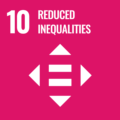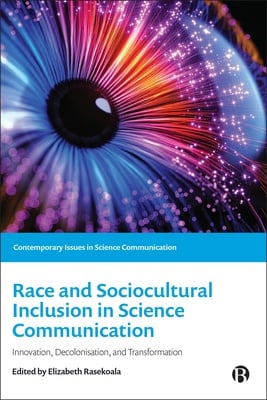In this month’s Global Social Challenges focus, we spotlight Elizabeth Rasekoala, who shares insights from her latest research, Race and Sociocultural Inclusion in Science Communication, which addresses some of the most critical issues explored in our Equity, Diversity and Inclusion theme. Our Global Social Challenges themes align with the UN’s Sustainable Development Goals, to help social scientists drive real-world impact.
Rasekoala’s seminal work challenges entrenched paradigms in science communication, and calls for nothing less than a paradigm shift to address the systemic inequities that have marginalised racialised minorities and excluded voices from the Global South. With themes that span decolonisation, global perspectives and innovative approaches, the book delivers an incisive critique of traditional practices, while offering actionable solutions to drive meaningful change.
Recognised by the CIMUSET Award Committee for its visionary contributions, this work is already shaping conversations and practices in science communication. From museum professionals to academics, it has become essential for anyone committed to fostering inclusion and reducing inequalities in alignment with Sustainable Development Goal 10.
In this interview, we talk to Elizabeth Rasekoala about her motivations for curating this volume, the challenges she faced in tackling such a complex and sensitive topic and the insights she hopes to impart to science communicators worldwide.
Your book emphasises the need to decolonise science communication. Could you share what inspired you to focus on this theme and how it can be implemented in practice across different global contexts?
The inspiration for such a focus was forged during the COVID-19 pandemic, when the global inequalities and divides inherent in the scientific enterprise and its communication were illuminated, interrogated and challenged like never before.
This period of dynamic global contestations across the socio-political-economic-cultural nexus of science and its communication demonstrated the imperative for transformative paradigm-shifting agendas beyond the limited scope of what ‘inclusive science communication’ had become. In the context of the profound Global North–South divide that had been so glaringly exposed during the pandemic, the signposting of the decolonisation agenda in science communication became self-evident. The practical implementation of this agenda in science communication begins with the ‘radical’ recognition that both Global North and South regions need to decolonise science communication practices, norms, narratives and approaches for their diverse publics. It also entails addressing critical issues of ‘ownership’, belonging, access pathways and equity by acknowledging the historical and contemporary developments and drivers of scientific knowledge, including by recognising the Indigenous knowledge and science capital of Global South regions. In this framing, the decolonisation agenda becomes an ‘equal opportunity’ challenge for both regions, and should therefore serve as a ‘bridge-building’ platform for creating innovative and equitable collaborative partnerships to deliver systematic change in inclusive and transformative science communication across the globe.
The book has received the CIMUSET Special Recognition Award and is already available for access via over 300 libraries worldwide. How does this level of recognition and reach reflect the growing urgency of addressing diversity, equity and inclusion in science communication?
The global reach and spread of the recognitions for this book, across many institutions, science communication networks and multilateral scientific institutions, reflect the growing international imperatives for sustainable change inherent in a post-COVID-19 world. These contexts elaborate how critical and urgent it is to implement enhanced inclusion and equity parameters and mechanisms in globally diverse science communication. This urgency is further driven by the need to address the myriad challenging legacies of the pandemic era across the globe – diminishing public trust in science and expertise; the expanding landscapes of mis-/dis-information platforms; and the growing hegemonic role of some national governments in the scientific knowledge and communication arena.
Can you tell us more about the book’s reception, particularly in academic citations, media coverage and on social media? What feedback or responses have stood out to you the most?
The book has been well cited in academic literature. Social media coverage as well as on other ‘science engagement/journalism’ online platforms has been extensive and undertaken by diverse science communication practitioners, networks and institutions across the globe. Twelve academic science communication course leaders have informed me that they have included it as a compulsory text for their courses. In addition, I have been invited to deliver keynote speeches at various international science communication and other network conferences, such as the Inclusive Science Communication Symposium (ISCS), held in the US in 2023; the 50th ICOM-CIMUSET Conference in South Korea in 2023; and the TWAS-UNESCO Skill Building Workshop in Senegal in 2024. I have also been granted the prestigious Osher Fellowship, through which I was able to spend three weeks at the Exploratorium in San Francisco in September 2024. Several observations have stood out for me during my engagement opportunities on the book:
- I have been struck by how many Global North practitioners have expressed that the book has given them a comprehensive insight into and ‘respect’ for science communication in the Global South regions of the world, illuminating the landscapes in these parts of the globe of which they had hitherto been wholly ignorant.
- The other feedback that has resonated many times from both Northern and Southern practitioners is how the book has made a powerful case for addressing the global North–South divides in science communication – a theme that many of them had not considered before!
- The book has, for many, made a link between advancing globally inclusive science communication and engendering increased public trust in science.
The book brings together perspectives from the Global South and other marginalised voices. How did you approach building the collaborations and partnerships necessary to ensure the richness and diversity of viewpoints in this volume?
This was actually the easiest part of the development process for someone like myself who had been working on these fronts for many years, across both the Global North and South. I have been engaging in collaboration, solidarity and ‘shared spaces’ with many colleagues in the inclusive science communication arena. This meant that it was relatively easy to assemble the partnerships needed to bring such insightful globally inclusive perspectives, storytelling, case studies, good practice exemplars and evidenced-based approaches.
Beyond the critical analysis your book provides, it also introduces innovative, action-oriented solutions. Could you share a specific impact story or an example of how individuals or institutions are already applying the ideas and frameworks presented in the book?
It has been very encouraging to receive feedback from many practitioners in diverse institutions regarding the innovative action-oriented solutions recommended in the book. In addition, my Osher Fellowship tenure at the Exploratorium has been an invaluable ‘hands-on’ opportunity to engage with and explore the challenges that science centres and museums encounter in their journey to becoming transformative and emancipatory ‘contact zones’ for their diverse publics, as they interface with science. These were very exciting manifestations – such as the impact on the diverse cohort of ‘Explainers’ of engaging with them in the adoption of good practice strategies highlighted in Chapter 1. Another area of impact was exploring with staff what the decolonisation of their scientific exhibits would encapsulate, and how this would boost and enrich the experiences of the diverse publics in this very multicultural city. Critical steps in this direction involved the embedding of ‘counternarratives’ and the inculcation of sociocultural resonances that deliver increased pluralistic visitor engagement and access. A related experience was my visit to the Alcatraz prison and museum – an exhibition rich in thought-provoking counternarratives that left me profoundly moved and encouraged by the understanding of our shared humanity, even when we commit ‘wicked’ acts. If only science centres and museums could engender such paradigm-shifting engagements with science, for all of their publics, in their curation activities!
Elizabeth Rasekoala is the President of African Gong: The Pan-African Network for the Popularization of Science and Technology and Science Communication. She is the first African female recipient of an International Science Communication award, the NAT AWARD 2019, conferred by the Natural Science Museum of Barcelona.
Part of Bristol University Press Equity, Diversity and Inclusion theme, Race and Sociocultural Inclusion in Science Communication: Innovation, Decolonisation, and Transformation reponds to the Reduced Inequalities SDG.


 Race and Sociocultural Inclusion in Science Communication edited by Elizabeth Rasekoala is available on Bristol University Press website. Order herefor £27.99.
Race and Sociocultural Inclusion in Science Communication edited by Elizabeth Rasekoala is available on Bristol University Press website. Order herefor £27.99.
Bristol University Press/Policy Press newsletter subscribers receive a 25% discount – sign up here.
Follow Transforming Society so we can let you know when new articles publish.
The views and opinions expressed on this blog site are solely those of the original blog post authors and other contributors. These views and opinions do not necessarily represent those of the Bristol University Press and/or any/all contributors to this site.
Image credit: National Cancer Institute via Unsplash


